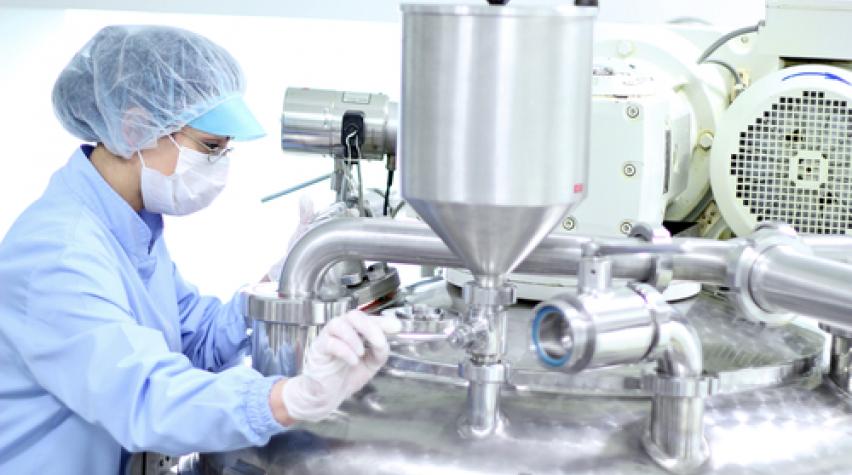
Does "ChE" mean "manufacturing" to your neighbor?
In a 4/28/2012 article in the Wall Street Journal, Gregory Zuckerman wrote about the "resurgence in the U.S. manufacturing sector." He focuses on a March report from Merrill-Lynch to argue that "the U.S. economy is in the early stages of a long-term manufacturing renaissance." Thus, manufacturing is in the US and global spotlight these days, and chemical engineers have a spot at the front of the stage. That probably will come as a surprise to the general public, including Capitol Hill - and maybe to some of us. A lot of people don't even think of us at all when they think "manufacturing." Why not? After all, they know fuels and pharmaceuticals and polymers and microelectronics and cosmetics and soft drinks have to be manufactured.
Manufacturing isn't just machines and assembly lines
Maybe the biggest reason is that the public thinks of manufacturing as making things mechanically with an assembly line. Look up "manufacturing." Merriam-Webster starts with "1: to make into a product suitable for use," which is fine, but then goes to "2a: to make from raw materials by hand or by machinery." When I looked in Wikipedia, I saw "Manufacturing is the use of machines, tools and labor to produce goods for use or sale" (Wiki correction now submitted!). Happily, it did go on to include our industries as manufacturing categories. Don't get me wrong: A plasma etcher can be construed as a machine or a tool - but it sure doesn't process chips mechanically. It is a chemical processing device. Processing may be batch or it may be continuous. We may use fermenters, distillation, mixers, spray drying, heat exchangers, affinity chromatography, chemical vapor deposition, or membrane separations.
Products aren't just things: they have properties
Manufacturing is popularly associated with making things: cars, clothes, TVs, furniture, and so on. ChEs often make "stuff" instead, but even in the "things," properties have grown increasingly important to creating product value.

BASF aimed to tackle this issue with its slogan, "We don't make a lot of the products you buy. We make a lot of the products you buy better."(TM) For example, your favorite smartphone is full of chips that ChEs have made, viewed on a display that was created by chemical processing, and covered by special impact-resistant glass, such as Gorilla Glass (see more about Gorilla Glass in this article from Wired). We also make products for industry, such as catalysts, ion-exchange resins, and polymer membranes. But yes, we also make "products you buy," like gasoline, antifreeze, prescription drugs, paints, and nonwoven fabrics. These substances' chemical, biological, and physical properties are the heart of their value. One more trend is the way manufacturing is focusing more on combining processes and properties, as opposed to machining and mechanical assembly of forms. Consider "additive manufacturing," such as microelectronics manufacturing and 3-D printing. Material properties are central. Consider nanotechnology, where improved properties drive much of the work. It takes people from multiple disciplines to bring most of these products to completion. Still, the ChE skill set is more and more crucial to successful manufacturing.
And we're all in manufacturing(?!)...
I'll go further. Most chemical engineers are part of the manufacturing enterprise, whether we're working in industry or not, and whether we are doing specifically technical work or not. More about that in next week's post, describing how the arrival of regenerative medicine is being led by ChEs in hospitals and academia, people who don't come to mind when manufacturing is mentioned. Nevertheless, this field is the birth of a new area of ChE-style manufacturing: "Tissue manufacturing."



Comments
There is some effort to talk about "Advanced Manufacturing" and "Smart Manufacturing" <a href="http://(https://smart-process-manufacturing.ucla.edu)" rel="nofollow">(https://smart-process-manufacturing.ucla.edu)</a> to emphasize certain aspects of the changing face of manufacturing, but the word still seems apt for what we do.
I think that the definition of "manufacturing" should be made more broad to include chemical and other processes - I think having a modifier like "Advanced Manufacturing" helps to denote that it is something different than what most people think of when they think "manufacturing" - its still changing a raw material, but in a different way. Never hurts to be specific!
Yes, I think "manufacturing" has taken a whole new meaning from the turn of the 19th century to the millennium. I believe the advances in robotics and computer engineering has brought about a whole dimension to "manufacturing." When it comes to manufacturing, I also see the increased focus on efficiency and lean. Since resource (people as well as materials) are scarce, the more efficiency we can gain, the more we can get out of the limited resources. I believe our ability to troubleshoot and problem solve plays an important role in manufacturing. What do you see as possible development in "manufacturing" in the next 5 years? What about next 10 years? What are the key game changers and enablers?
Smart Manufacturing should be one of the game-changers <a href="http://(http://smartmanufacturing.com)" rel="nofollow">(http://smartmanufacturing.com)</a>. Its gist is information management and use, from the supply chain to the process operations to safety/environmental monitoring and control.
I encourage you to take a look at three views of the future of ChE manufacturing: <a href="https://smartmanufacturingcoalition.org" rel="nofollow">https://smartmanufacturingcoalition.org</a> <a href="http://www.aiche.org/resources/publications/cep/2008/november/chemical-engineering-next-25-years" rel="nofollow">http://www.aiche.org/resources/publications/cep/2...</a> Also, while I was disappointed to see little inclusion of ChE manufacturing, take note of Manufacturing Day on October 5, 2012 <a href="http://(www.mfgday.com)" rel="nofollow">(www.mfgday.com)</a>.
I had no idea about Manufacturing Day! I will have to see if my plant can get involved next year!
I've read this post too late. I too, was not aware of the Manufacturing Day! Something definitely to consider - maybe better education/spreading the word in the AIChE YP community will help as well?
Hey there! Someone in my Facebook group shared this site with us so I came to give it a look. I'm definitely enjoying the information. I'm book-marking and will be tweeting this to my followers! Exceptional blog and superb design and style.